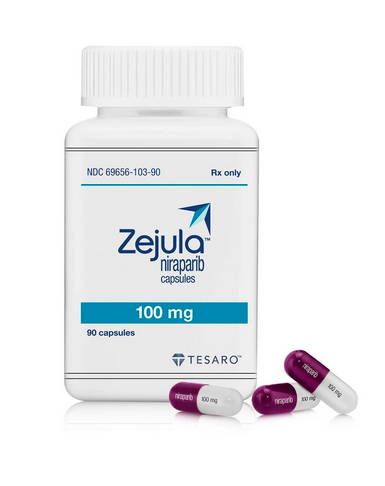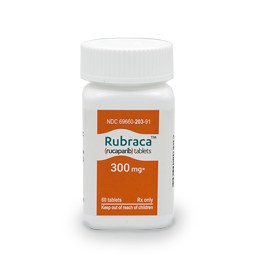Zejula (niraparib) vs Rubraca (rucaparib)
Zejula (niraparib) vs Rubraca (rucaparib)
Zejula (niraparib) and Rubraca (rucaparib) are both oral PARP inhibitors used in the treatment of certain types of ovarian cancer, with Zejula also approved for the maintenance treatment of ovarian, fallopian tube, or primary peritoneal cancer. Zejula is often prescribed as a once-daily medication, which may be more convenient for some patients, while Rubraca's dosing schedule can vary based on the indication and patient's needs. It is important for a patient to discuss with their healthcare provider their specific medical condition, history, and potential side effects of each medication to determine which treatment is the most appropriate for their individual situation.
Difference between Zejula and Rubraca
| Metric | Zejula (niraparib) | Rubraca (rucaparib) |
|---|---|---|
| Generic name | niraparib | rucaparib |
| Indications | Ovarian, fallopian tube, or primary peritoneal cancer maintenance treatment; HRD-positive ovarian cancer after 3 or more chemotherapies | Ovarian cancer treatment after two or more chemotherapies; BRCA-mutated ovarian cancer maintenance treatment |
| Mechanism of action | Poly (ADP-ribose) polymerase (PARP) inhibitor | Poly (ADP-ribose) polymerase (PARP) inhibitor |
| Brand names | Zejula | Rubraca |
| Administrative route | Oral | Oral |
| Side effects | Anemia, thrombocytopenia, neutropenia, hypertension, nausea, fatigue, insomnia, headache, vomiting, abdominal pain, constipation, and others | Anemia, fatigue, nausea, dysgeusia, constipation, vomiting, decreased appetite, diarrhea, abdominal pain, dyspnea, and others |
| Contraindications | Hypersensitivity to niraparib or any of the excipients | Hypersensitivity to rucaparib or any of the excipients |
| Drug class | PARP inhibitor | PARP inhibitor |
| Manufacturer | GlaxoSmithKline (GSK) | Clovis Oncology |
Efficacy
Zejula (Niraparib) Efficacy in Gynecological Cancer
Zejula (niraparib) is a poly (ADP-ribose) polymerase (PARP) inhibitor indicated for the treatment of certain types of gynecological cancers, including ovarian, fallopian tube, and primary peritoneal cancers. It has been approved for the maintenance treatment of adult patients with recurrent epithelial ovarian, fallopian tube, or primary peritoneal cancer who are in a complete or partial response to platinum-based chemotherapy. Clinical trials have demonstrated that niraparib significantly improves progression-free survival (PFS) in this patient population, regardless of BRCA mutation status. This efficacy has positioned niraparib as a valuable option for maintenance therapy in gynecological cancers.
Rubraca (Rucaparib) Efficacy in Gynecological Cancer
Rubraca (rucaparib) is another PARP inhibitor used in the treatment of gynecological cancers. It is specifically approved for patients with deleterious BRCA mutation (germline and/or somatic)-associated epithelial ovarian, fallopian tube, or primary peritoneal cancer who have been treated with two or more chemotherapies. Rucaparib has shown a significant clinical benefit in terms of objective response rate (ORR) and PFS in patients with these BRCA-mutated cancers. Its approval was based on studies that demonstrated its efficacy in shrinking tumors and delaying disease progression, offering a targeted treatment approach for patients with BRCA mutations.
Comparative Efficacy of Zejula and Rubraca
While both Zejula and Rubraca are effective in the treatment of gynecological cancers, their indications differ slightly based on patient characteristics and treatment history. Niraparib's broader approval for maintenance therapy allows its use in a wider patient population, including those without BRCA mutations. Rucaparib's efficacy is more specifically targeted to those with BRCA mutations and who have undergone multiple lines of chemotherapy. Both drugs have shown the ability to improve outcomes in their respective approved indications, but direct comparative studies are limited, and the choice of agent may depend on individual patient factors, including BRCA mutation status, prior treatments, and tolerance of the drug.
Considerations for Use
When considering the use of either Zejula (niraparib) or Rubraca (rucaparib) for gynecological cancers, it is important to evaluate the patient's specific clinical scenario. Factors such as BRCA mutation status, previous chemotherapy regimens, and overall health will guide the decision-making process. Both medications also come with a risk of side effects, which must be balanced against the potential benefits. As with all cancer treatments, the efficacy of PARP inhibitors must be assessed on an ongoing basis to ensure the best possible outcomes for the patient.
Regulatory Agency Approvals
Zejula
-
European Medical Agency (EMA), European Union

-
Food and Drug Administration (FDA), USA

-
Health Canada

-
Therapeutic Goods Administration (TGA), Australia

Rubraca
-
European Medical Agency (EMA), European Union

-
Food and Drug Administration (FDA), USA

Access Zejula or Rubraca today
If Zejula or Rubraca are not approved or available in your country (e.g. due to supply issues), you can access them via Everyone.org.
How it works

Make an enquiry
Choose the medicine you want to buy, answer a couple of questions, and upload your prescription to speed things up. We’ll get back to you within 24 hours.


Make an enquiry
Choose the medicine you want to buy, answer a couple of questions, and upload your prescription to speed things up. We’ll get back to you within 24 hours.


Breeze through the paperwork
We'll guide you through the required documents for importing unapproved medicine, ensuring you have all the necessary information.


Get a personalized quote
We’ll prepare a quote for you, including medicine costs and any shipping, administrative, or import fees that may apply.


Receive your medicine
Accept the quote and we’ll handle the rest - sourcing and safely delivering your medicine.

Some text on this page has been automatically generated. Speak to your physician before you start a new treatment or medication.
Let's talk
If you have any questions, call us or send us a message through WhatsApp or email:
Contact us




